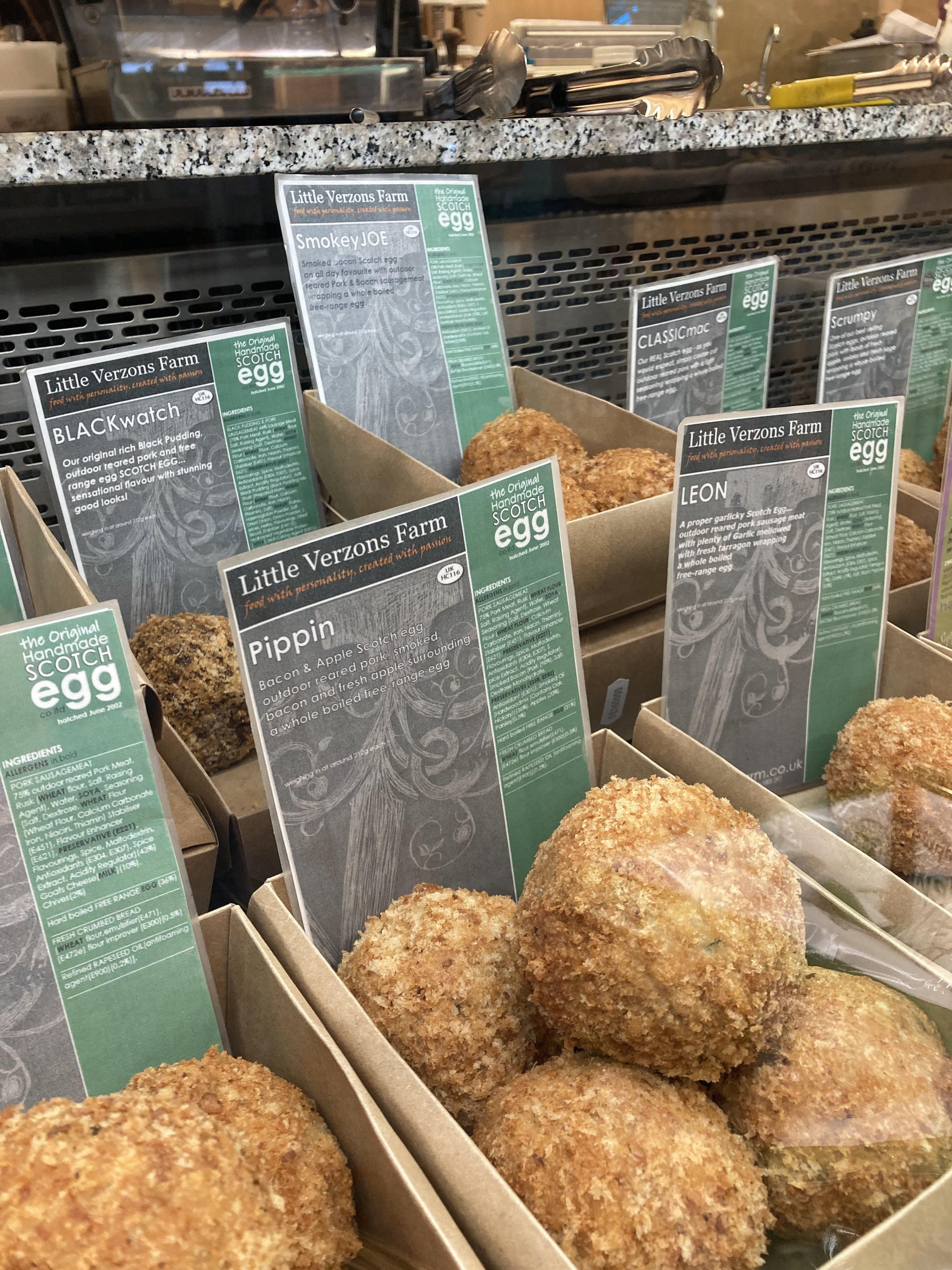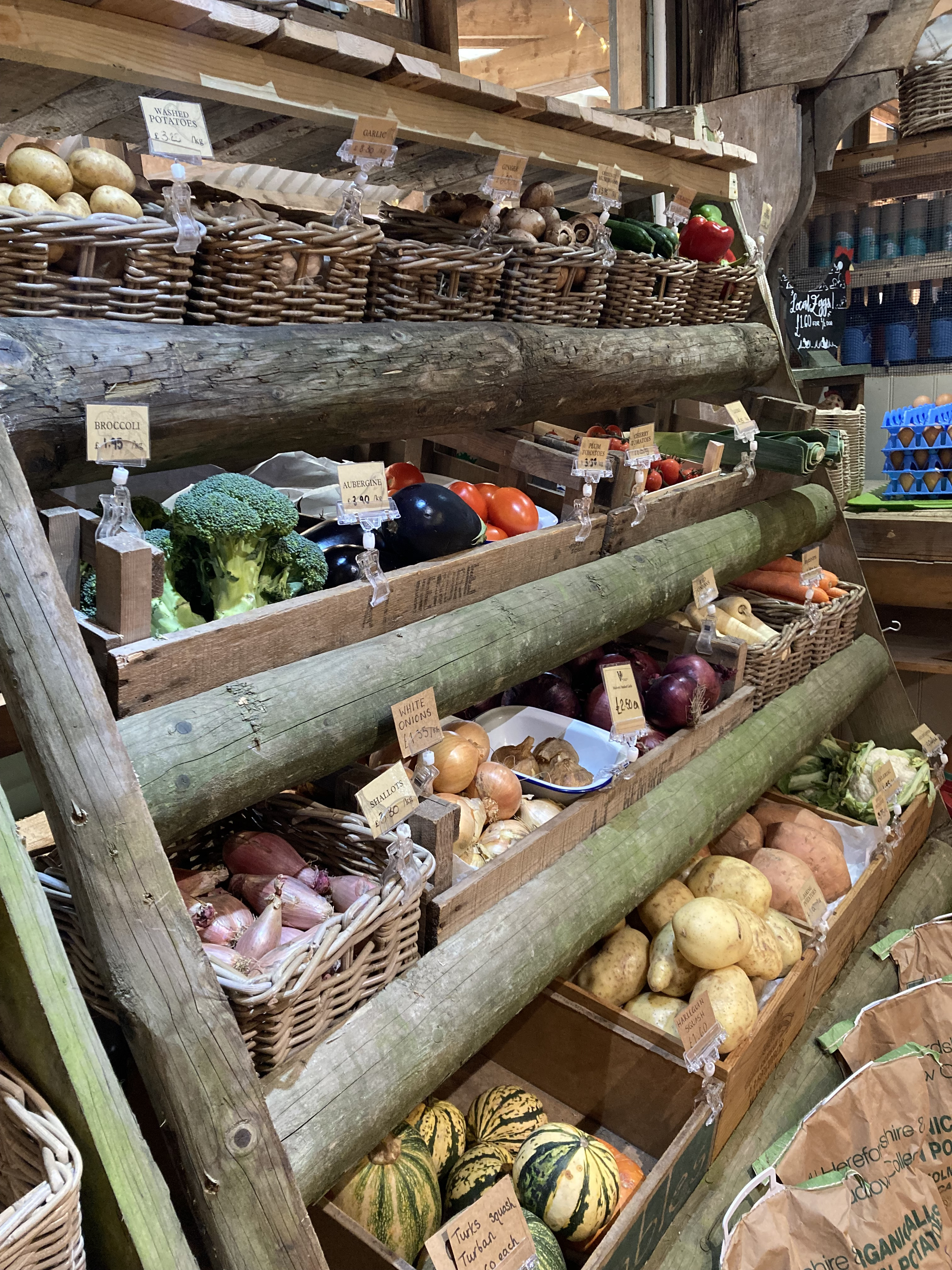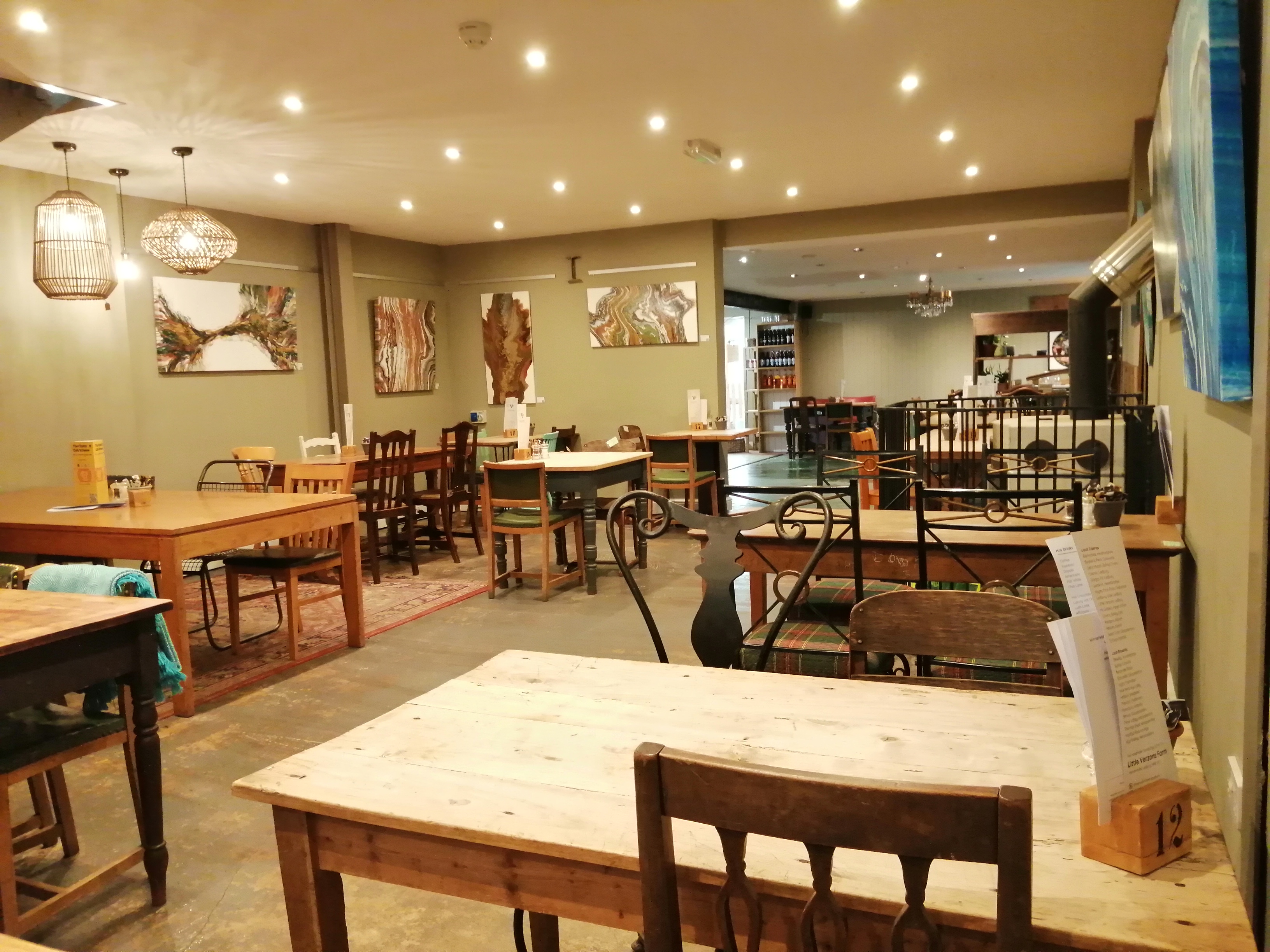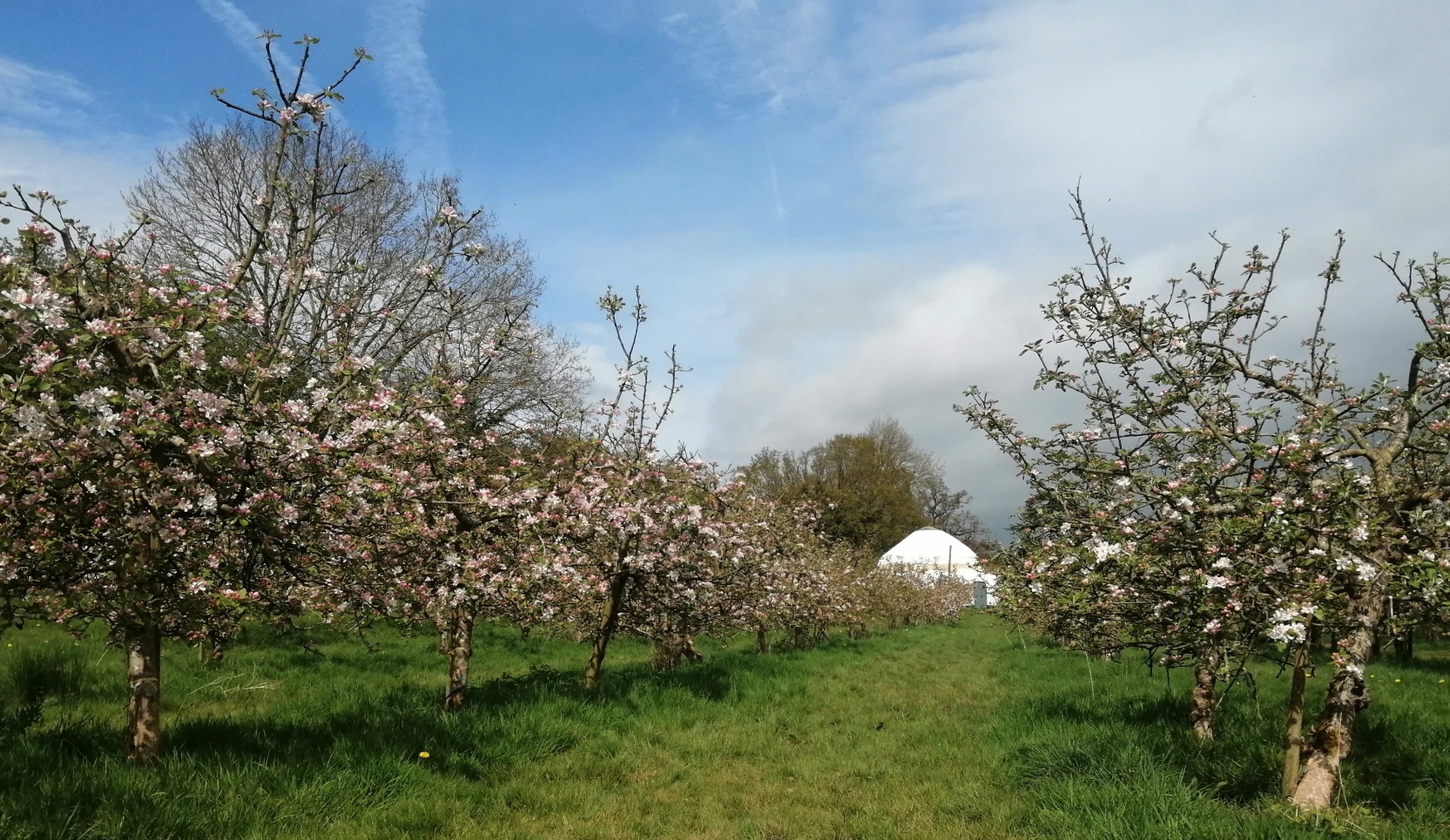Free digital copy
Get Speciality Food magazine delivered to your inbox FREE
Get your free copy
Neil Chambers paints an idyllic, bucolic picture of life with wife Penny. One that sees them triangulating their time between holding hands, walking through the orchards at 14-acre Little Verzons Farm (their Ledbury home), popping into The eggShed up the road to say hello to the team running their Scotch egg production line, or pottering at The Nest – their farm shop, cafe and events venue.
It’s an ever-evolving, eclectic, idiosyncratic life – reflected in their businesses which, Neil is proud to say, are (and have always been) a little bit different. Perhaps that’s the secret to their success? Today, The eggShed and The Nest are a multi-million-pound operation – quite a feat considering both are Penny and Neil’s ‘second career’. Neil’s background being in engineering and art, while Penny started out in the secretarial world.
“Our lives changed when Penny took a job as a housekeeper in a stately home,” Neil says. “She was out doing shopping for her boss in the local town and overheard a lady in the queue asking for some Scotch eggs. The girl behind the counter said, ‘I’m really sorry, we haven’t had time to make any this week’, and I don’t know why but Penny said, ‘If I make some, would you take them?’.”

Penny’s always relished cooking and feeding people but, says Neil, her mother wouldn’t allow her to apply for catering college. “She thought it was a lowly position. She didn’t see it as a career!”
From making Scotch eggs for a local shop, Penny soon began to advance her foodie career, becoming the in-house caterer for Birmingham Symphony Orchestra, while Neil conjured up murals for clients while working in architectural paint finishing. “Then we hit our 40s and thought, maybe we need to consider our future. We were having a nice time, but we weren’t earning an awful lot of money.”
Life changed again when they discovered farmers’ markets. “They were in their infancy back then. But we thought ‘this is rather nice’. We started to talk about what we could make and sell, as a hobby really. At the time Penny listed Scotch eggs, quiches and cakes, and we whittled it down to Scotch eggs because no one else was doing them. We had no real business plan, to be honest! If it didn’t work, we said we’d try something else.”
Little did they know how fierce the appetite for their products would become. The Handmade Scotch Egg Company (now under the Little Verzons Farm banner) took off, attracting long queues of fans, drawn to the couple’s delicious, seemingly endless array of flavours.
“Our first pitch was in 2002. It wasn’t a proper farmers’ market. It was in the car park of a local pub, but it had a reputation. They used to appear on Radio 4, and Nigel Slater had his first catering job there while studying at Worcester University. I’d say it was one of the first foodie pubs…embracing real food.
“I think we turned up with about six recipes, from a classic, to a black pudding one, a scrumpy one with apple, sage and onion, and a vegetarian one. People didn’t expect it. They loved what we did, and over the next few years, talking to customers about what they liked and didn’t like, we ended up with a huge range.”
Which was a novelty. “I took 36 different recipes to The Good Food Show. People were queueing to buy a dozen at a time,” Neil laughs. “No one else was doing what we were doing, and we grew quite quickly.”
That included travelling to other markets, and gradually onboarding delis and shops keen to tap into the trend, all the while working from their home kitchen.
“When our annual inspection took place, our EHO inspector picked up on the fact we were selling to a couple of local shops and said that changed the rules a bit. It was a very friendly conversation about the viability of us working from home, and because of that we took on a small unit at a craft centre five miles away to tick all the boxes.”

Despite what has come to pass since then, Neil says resolutely the hardest part of their journey was moving into that unit. “It means you’re no longer doing something you like. It’s a proper business. It was absolutely terrifying. We took the smallest unit they had, and within two months we were looking at another one because it wasn’t big enough!” After the first leap, growth becomes natural, he says. “We went from just the two of us at home with a lovely lady called Barbara boiling and peeling the eggs, to having a team of five other local ladies helping us with the rolling, while I did the packing and delivering.”
Growth went on and on, expanding and extending, until they reached capacity. A separate office was a must. Neil was on the hunt. And in a moment of serendipity, a member of the team mentioned Little Verzons Farm.
“It had a ridiculous price tag. Way out of our league,” says Neil of their first viewing. They went back and forth. Ruminated. And managed to get a surveyor out thanks to their friendly bank manager. “They said it’s falling down, it’s not worth anything, and they’d advise walking away from it.”
Through a stroke of luck the former owner was happy to shake on the reduced sum. “We got it for half the asking price! Fourteen acres of Herefordshire. The barn had been a farm shop and there was a garden centre that had been closed for some time – all the polytunnels were rotting. It was in a shocking state, which is probably why they let it go at a song,” Neil reflects.
A lot has changed in the 10 years since the keys were handed over. “We laugh that all of this has been bought with eggs,” Neil smiles. “It’s just lovely the way it’s evolved. We’ve got exactly what we want without knowing what we were aiming for. This place is very much ‘Penny’ and ‘Neil’. It’s ‘us’. Everyone tells us we’re slightly quirky, and that’s what I like!”
While the production kitchen remains at The eggShed, The Nest at Little Verzons Farm is the customer-facing operation of Penny and Neil’s business, starting as an office with a small area selling Scotch eggs and coffee below, with staff from the premises’ former business re-employed to run the counter.
“People would then come in and say, ‘can you do a bacon sandwich?’ and Debs would make them a bacon sandwich. That started to take off and she’d nag me, saying we needed to do more, and I’d tell her I never wanted a cafe, I wanted a shop. But there was a demand. We’re three miles from Ledbury and it’s a nightmare to park there – we’ve got parking for 150 to 200 cards. Immediately we realised it could work, and we gradually put the cafe in.”

It was an instant hit – especially the monthly fixed menu supper club evenings cooked by Penny, and served by Neil, Debs and her daughter. “It became a part of, and was accepted by the community, because we were doing it for them. That’s a big part of its success,” Neil reflects.
“Then we were asked to start selling local wine and cider….and one Christmas my nephew asked me, after too many glasses of wine, if he could get married here…so we started doing weddings and events too.”
Being adaptable, and restless, is in both Penny and Neil’s natures. “That’s part of the fun of it,” he jokes. “We built this business out of hard graft, tenacity, and being open to change. And let me tell you, we started with nothing. Zero investment. We didn’t even have a fridge. I used to go into a supermarket and get their freezer bags to take Scotch eggs to market in. The bowls we presented them in were our cereal bowls from home!”
A can-do attitude is what’s propelled the couple and their business forward. “I really think that if you believe in yourself and what you can do, you should just get on with it. Anything’s possible.”
The experience at The Nest far surpasses the tiny Scotch egg and coffee counter the team started with. A landscaper, Mark, has taken on the old plant centre, reviving the polytunnels, while other outbuildings have been let out to tenants including an interior design business, and a florist, with a dog groomer operating from a converted caravan.
The farm shop is, says Neil, very stylish, individual and imaginative. “It’s far removed from a supermarket. We’ve got a nice mixture of local pottery alongside crafts, art and lots of lovely food and drink. I think we’ve got the biggest collection of Herefordshire and Worcestershire cider in the two counties – 300 different bottles I think!” These are joined by juices, made by Penny and Neil, using fruit from the farm’s orchard.
Scotch eggs are, of course, a big feature of the 6ft deli counter, alongside a range of other savouries from their production kitchen, their own made chorizo and salami, and a huge range of regularly changing cheeses, supporting local producers as much as they can.
“I still have a farmers’ market mentality,” Neil admits. “We really are a glorified market in relation to the producers and way we sell. We want producers to be a part of what we do. They have stalls here from time to time at the front so they can meet everyone and talk to customers face-to-face without it being a ‘showcase’ or anything grandiose.”
The beating heart of Little Verzons Farm is the cafe, responsible for 50% of the site’s takings. Having a cafe (even though he was reluctant at the start), has, Neil yields, been one of the best things they could have done. “I’d say 99% of visitors to the site will go to the cafe. We make our own cakes, people can try our Scotch eggs, and we have a menu of brunchy food. Our rarebit (made with local cider rather than beer) had quite a following because it’s a bit different.”
In addition to selling fresh, homemade food, a big draw to the cafe is its capacity – both inside and out. Farm shops and garden centres shouldn’t underestimate their car parking facilities, says Neil, especially if, like Little Verzons, the nearest town or village proves tricky, or expensive, for parking. Here, the convenience regularly draws families of 12 or more, plus groups and baby showers to the site.
“One of the things that’s quite fun is all our furniture is for sale, so the layout and configuration of the cafe changes all the time. We have a relationship with a local scrap man and antiques dealer in one of our barns. All our tables and chairs are his and it means we often have big farmhouse tables seating 10. It allows us to be really flexible for groups.”

When you’re starting out in retail or food production, swept up in the minutiae of running the day-to-day operations, the future (unless you’re very organised) is unlikely to be set into your immediate plans. Penny and Neil are by their own admissions rather quite fly-by-night, doing everything as and when it comes naturally, and didn’t think about retirement until two years ago. With no family to pass Little Verzons on to, the decision was made to bring someone in to operate the business while they travelled Europe in a campervan with their dogs.
“We thought, ‘this is great – we can escape, and it’s all still going on without us – but it wasn’t quite in the right shape after we came back. And we realised things weren’t going quite as well as they should be.”
Something needed to change, but the couple, who’d previously invested in a headhunter, soon realised they didn’t need to look further than the team they already had to ensure the ongoing success of their countryside empire. The people who know every aspect of what they do inside out.
“We’ve taken a step back,” says Neil. “We go to team meetings on a Thursday, and we’ll pop in now and then, but without specific jobs. We have a general manager at each site and they have risen up to the responsibility. We are more the driving force and administrative force. Annie and Di, who run The eggShed and The Nest are basically doing it without us, and it’s really nice to see.”
You have to learn to trust your team, and accept people can do jobs better than you, Neil continues. “That’s the trick. To learn you’re not the best at everything, and to encourage people within your team so they can become better than you. That’s so important if you want to grow. We haven’t made Scotch eggs for the last 10 to 12 years, but they’re produced using the same recipes, in exactly the same way as we made them when we started. Some of the people in the kitchen have been with us for 18 years. The only problem is who is going to come in next to replace the team we have now. That is a worry, but I’m keeping a keen eye on the younger members of staff!”
Penny and Neil have a great deal of advice for fellow food retailers, and those thinking about transforming outbuildings into a farm shop.
For starters, be prepared to have a Plan B, and don’t be afraid to change. This is something the team learnt very quickly during Covid. Up until that point Neil was adamant they should continue to offer their 36 varieties of Scotch egg, but due to restrictions, the more flavours they had in their wheelhouse, the more people they required on site, which wasn’t possible. “We just made the classic Scotch egg, nothing else. As we grew back out of Covid we stopped doing events and going out on the road, selling only to trade with a few sales online, and we now only offer 15 recipes at one time. One thing we realised was the amount of cooking oil we used changed dramatically depending on how many varieties we were making. If we made a chilli Scotch egg, we couldn’t use the oil again because the next flavour would be contaminated.
“Changing that, limiting our range, has halved the amount of oil we use.”
His second point is to listen to your regular customers and give them what they want – if it’s financially feasible. “We don’t like to follow or lead, we like to be different, to make people smile when they come in. The way we work means we have customers who come in literally every single day.”
Additions in response to demand are being dog-friendly (customers are welcome to walk their dogs in the grounds, with footpaths dug in), and family-friendly, following the introduction of a swing and pedal tractors. Neil feels investing in expensive play areas isn’t worth the money. He’s found children prefer the simpler things in life. “Those big attractions are fun the first time, but for mums and dads coming here all the time, after a while they lose the novelty appeal for their children. Also, once you’ve invested what could be hundreds of thousands of pounds, you’re tied to those changes.
“You wouldn’t believe how many kids love the pedal tractors!”
Finally, everything rests on loving what you do. “Otherwise, there’s no point doing it.”